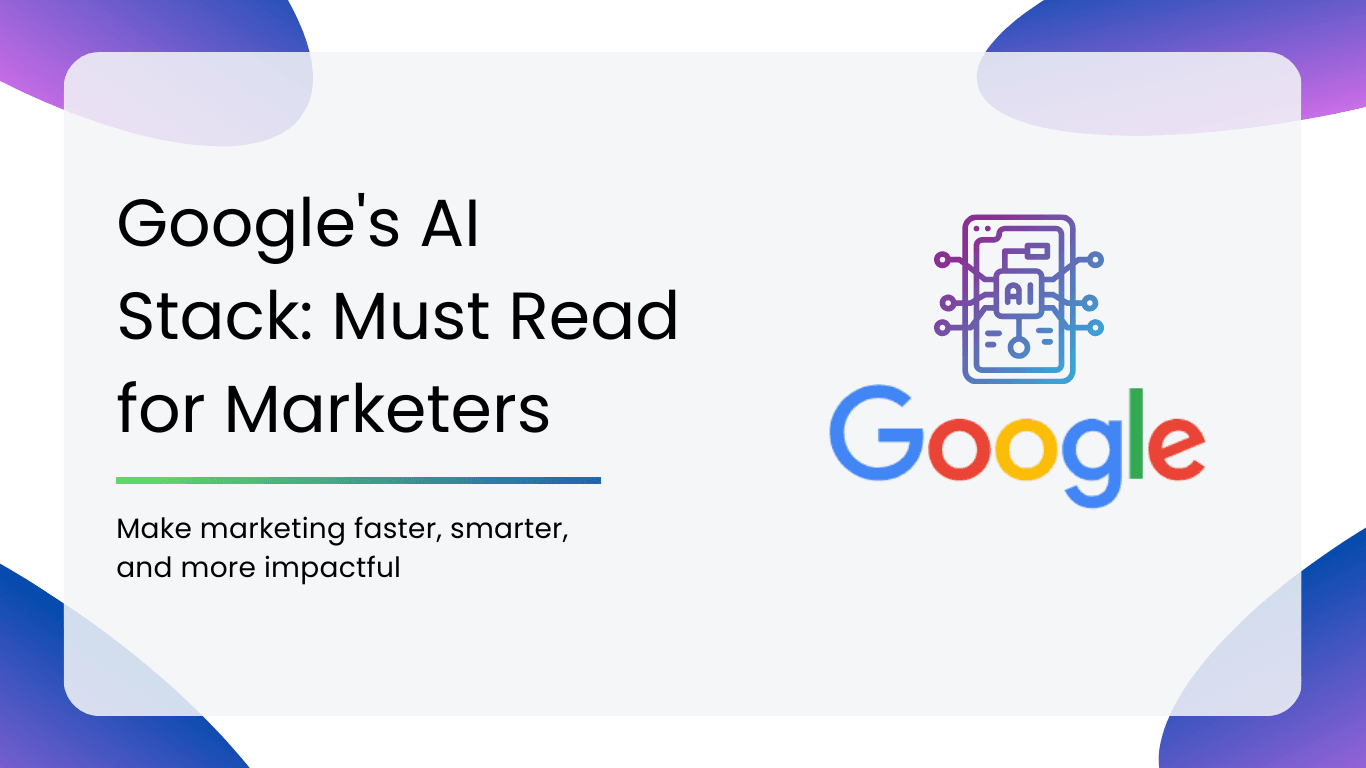Google’s AI stack is making waves, and if you’re a marketer, then it’s time for you to pay attention. Whether you’re new to AI or have heard the term thrown around, understanding Google’s AI tools can give you a serious edge.
From automating routine tasks to uncovering hidden customer insights, these technologies are designed to make marketing faster, smarter, and more impactful.
So, what exactly is Google’s AI Stack? And how can it help with your marketing game? Let’s break it down in simple terms and explore why it’s a must-know for today’s digital marketers.
The Foundation Models Behind Google’s AI Ecosystem
1. PaLM 2: Multilingual LLM Powering Bard, Workspace, and more
Before Google’s Gemini models became central to its AI ecosystem, PaLM 2 (Pathways Language Model 2) powered many of the company’s key tools, including Bard, Google Workspace smart features, and Med-PaLM 2 for healthcare.
PaLM 2 was recognized for its multilingual abilities (supporting over 100 languages) and versatility across various tasks, ranging from drafting and summarizing documents to generating content ideas and providing insights. It also came in different sizes, including Gecko, a lightweight version that could run on mobile devices for use on-the-go.
While PaLM 2 has now been fully replaced by the Gemini family, understanding it provides important context for the evolution of Google’s AI. Marketers who once used tools powered by PaLM 2 will find that Gemini offers a faster, more capable, and more integrated experience. Still, the core principles like speed, multilingual reach, and smooth integration into Google’s ecosystem remain the same.
2. Gemini: Your All-in-One AI Assistant for Marketing
Gemini is Google’s flagship AI assistant that seamlessly integrates across Google Workspace and Cloud platforms to supercharge your marketing efforts. Whether you’re creating compelling ad copy, analyzing campaign performance, or personalizing customer experiences, Gemini is your go-to tool for efficiency and creativity.
Gemini’s multimodal capabilities allow you to interact using text, voice, and images, making it versatile and user-friendly. It can generate first drafts for emails, blog posts, and presentations, summarize documents, and even create custom visuals in Google Slides with it. In Sheets, Gemini can assist in outlining marketing campaigns, suggesting content, and organizing data. In Meet, it enhances your video calls by adjusting lighting and framing, ensuring you look your best during client interactions.
For marketers, Gemini is a game-changer. It helps you quickly craft messaging, evaluate large amounts of information, summarize documents or emails, and automate regular tasks, giving you more time to focus on strategic and creative aspects of your work.
Gemini also lets you analyze campaign performance, identify areas for improvement, and craft iterations for A/B testing. It enables you to deliver personalization at scale by crafting targeted, personalized messaging based on customer data. Additionally, it helps lower content creation costs by quickly generating first drafts, increasing your output without the need to scale up resources.
3. Codey: For AI Code Generation and Developer Productivity
Codey is Google’s AI-driven coding companion built on the powerful PaLM 2 architecture. Designed to assist developers and marketers alike, Codey can generate, explain, and debug code across over 20 programming languages, including Python, JavaScript, C++, and Go.
Whether you’re creating a custom automation script, integrating APIs, or building a data pipeline, Codey simplifies the process by turning natural language prompts into functional code snippets. For instance, you can ask, “Write a Python script to clean up this CSV file,” and Codey will generate the code for you.
Codey is available through Google Cloud’s Vertex AI platform and can be accessed via APIs, making it easy to integrate into your development workflow. Additionally, it works seamlessly in Google Colab, allowing you to generate code directly within your notebooks.
For marketers, Codey can be a game-changer. It enables you to automate repetitive tasks, analyze data more efficiently, and even generate code for SEO optimizations or campaign tracking.
4. Imagen: Text-to-Image for Brand Creatives and Media Teams
Imagine describing a scene, and having an AI generate a photorealistic image of it in seconds. That’s the magic of Google’s Imagen, a cutting-edge text-to-image model developed by DeepMind.
Imagen 3, the latest version, takes this capability to new heights. It produces images with sharper clarity, improved spelling and typography, and near real-time speed, making it ideal for marketers and creatives who need high-quality visuals quickly.
You can generate custom images tailored to your brand’s voice and aesthetic without relying on stock photos. In a world where visual content is king, Imagen empowers marketers to stay ahead of the curve by producing unique, high-quality images that resonate with audiences.
5. Chirp: Speech-to-Text for Captions, Transcripts, and Voice Content
Chirp is designed to convert spoken language into written text with remarkable accuracy and speed. Chirp delivers 98% speech recognition accuracy in English and significant improvements in several languages with fewer than 10 million speakers.
Whether you’re transcribing podcasts, generating captions for videos, or converting meeting notes into text, Chirp streamlines the process, saving you time and effort. Its real-time transcription capabilities make it ideal for live applications such as customer service or real-time captioning.
For marketers, Chirp enhances accessibility and engagement by enabling the creation of transcriptions and captions for multimedia content, making it more inclusive and searchable.
With Chirp, you can effortlessly integrate speech recognition into your applications, ensuring your content reaches a broader audience and complies with accessibility standards.
6. Veo: Text-to-Video with Native Audio for Marketers
Veo produces high-resolution videos with synchronized audio, including sound effects, ambient noise, and even dialogue, making it ideal for marketers. Veo can bring your ideas to life with stunning realism.
You can also watermark your AI-generated videos, ensuring authenticity and protecting your creative assets. In a world where video content is king, Veo empowers marketers to stay ahead of the curve by producing unique, high-quality videos that resonate with audiences.
7. NotebookLM: Your AI-Powered Research Assistant
NotebookLM is designed to help marketers and content creators streamline their workflows and enhance productivity. NotebookLM allows you to upload various sources, including Google Docs, PDFs, websites, and audio files, and transforms them into interactive notebooks.
These notebooks enable you to ask questions, summarize content, and generate new ideas; all within a unified interface. The platform’s integration with Google Gemini ensures accurate and context-aware responses, making it an invaluable resource when dealing with complex information.
One standout feature is the Audio Overviews, which convert your sources into engaging, podcast-style summaries. Additionally, the Interactive Mode lets you engage in real-time conversations with AI hosts, providing a dynamic learning experience.
8. Google Stitch: Transform Ideas into App Interfaces Instantly
This AI-powered tool from Google Labs allows you to turn simple prompts or images into polished UI designs and frontend code in minutes. You can input a description, and Stitch will generate a responsive UI complete with layout, fonts, and colors.
Stitch offers multiple design variants per prompt, allowing you to explore different styles and layouts effortlessly. Once satisfied, you can export your design to Figma for further refinement or download the HTML/CSS code for immediate use.
For marketers, Stitch enables rapid prototyping, quick iterations, and the ability to visualize concepts without the need for extensive design expertise.
Core Tools Marketers Should Know About
1. Duet AI for Workspace
Duet AI is like a smart assistant built right into Workspace apps, like Docs, Sheets, Slides, and Meet. It helps marketers create content faster, summarize long documents, and even take live notes during meetings, so you never miss a key point.
Key Features:
- Content Generation: Quickly draft emails, reports, or campaign copy right inside Google Docs. Duet AI suggests wording and structure to make your writing clear and impactful.
- Data Summaries: Let Duet AI analyze data in Sheets and summarize key trends without complex formulas.
- Presentation Design: Get help creating polished Slides with layout suggestions and tailored content aligning to your marketing message.
- Live Meeting Notes: Automatically capture notes, action items, and summaries during Google Meet calls so you can stay focused on the discussion.
- Collaborative Workflow: Duet AI works seamlessly across all Workspace apps, enhancing teamwork and productivity.
2. Vertex AI
Vertex AI is designed to help businesses build, deploy, and scale AI models with ease. It offers a comprehensive suite of tools for marketers looking to integrate advanced AI capabilities into their applications and workflows. Whether you’re developing AI-driven marketing tools, enhancing customer experiences, or building custom applications, Vertex AI provides the infrastructure and tools to bring your ideas to life.
Key Features:
- Model Garden: Access a curated library of over 200 foundation models, including Google’s proprietary models like PaLM 2, Imagen, and Chirp, as well as third-party and open-source models.
- Generative AI Studio: Rapidly prototype and test generative AI models using an intuitive interface. Design and fine-tune prompts, experiment with various models, and prepare your applications for deployment.
- Model Tuning: Customize foundation models to excel in your specific domain by fine-tuning them with your labeled datasets.
- Prompt Optimization: Improve the effectiveness of your prompts at scale using Vertex AI’s prompt optimizer to enhance model performance.
- Enterprise-Grade Security: You can customize models with your data while maintaining full control over where and how your data is used, keeping your information secure and private.
3. Gen App Builder
Gen App Builder is a no-code platform to create custom AI-powered applications quickly and easily. Without needing any machine learning expertise, you can build chatbots, search tools, and virtual assistants. This is ideal for creating content search apps, internal Q&A search bots, or even customer-facing support agents.
Key Features:
- No-Code Interface: Gen App Builder offers a user-friendly, drag-and-drop interface that simplifies the process of building AI applications without any coding knowledge.
- Multimodal Capabilities: Create applications that can process and respond with text, images, and videos, enabling richer interactions and more dynamic user experiences.
- Customizable Workflows: Utilize pre-built templates and workflows for common tasks such as onboarding, data ingestion, and customization.
- Enterprise-Grade Security: Ensure your applications meet organizational standards with built-in security features and compliance controls.
- Seamless Integration: Easily integrate Gen App Builder with your existing systems, allowing for the creation of applications that are deeply connected to your organization’s resources.
4. Duet AI for DevOps
It is an AI-powered assistant integrated into popular development environments. It helps developers write, debug, and deploy code more efficiently. Duet AI accelerates development workflows and reduces the complexity of managing cloud infrastructure. With features like inline code suggestions, natural language queries, and seamless integration with Google Cloud Services, Duet AI enhances productivity and collaboration across the development lifecycle.
Key Features:
- Code Assistance: It offers real-time code suggestions, completions, and inline documentation. It understands your coding context and provides relevant recommendations too.
- Natural Language Queries: Ask a question in plain language, and Duet AI interprets your intent to provide accurate responses.
- Seamless Cloud Integration: Duet AI assists in integrating, configuring and managing Cloud resources, streamlining the deployment process.
- Remote Development Environments: Utilize Cloud Workstations and Cloud Shell Editor to develop applications in a consistent, cloud-based environment.
- Debugging and Troubleshooting: Set breakpoints, step through code, and view logs directly. Duet AI aids in identifying issues and suggesting fixes.
5. AppSheet + Duet AI
AppSheet enables marketers to create custom applications and automations using data from Google Sheets, Salesforce, and more. With the integration of Duet AI, building intelligent apps becomes even more intuitive. This can help teams rapidly develop tools for lead tracking, approval processes, and other business needs.
Key Features:
- Natural Language App Creation: Describe your app’s purpose in simple language, and Duet AI generates the necessary structure, streamlining the app development process.
- AI-Driven Automations: Set up workflows and automations by simply outlining the desired process. Duet AI interprets your instructions to create bots that handle tasks like approvals, notifications, and data updates.
- Seamless Data Integration: Connect your app to various data sources, such as Google Sheets, Salesforce, and other cloud-based platforms, ensuring your app operates with up-to-date and accurate information.
- Cross-Platform Accessibility: Develop apps that are accessible on desktop, mobile, and tablet devices, ensuring your team can access and interact with the app from anywhere.
- Enhanced Collaboration: Share and collaborate on app development within your organization, allowing for iterative improvements and feedback.
6. MakerSuite
MakerSuite is a browser-based integrated development environment (IDE) to quickly prototype and experiment with AI prompts using Google’s Gemini models. Users can design, test, and refine prompts to build custom AI features for campaigns, content generation, and customer interactions.
Key Features:
- Intuitive Prompt Engineering: Create and test prompts using a user-friendly interface, enabling quick iterations and refinements to achieve desired AI responses.
- Multimodal Input Support: Incorporate text, images, and code into prompts to create rich, interactive AI experiences that cater to diverse marketing needs.
- Code Export Capabilities: Once a prompt is refined, export it as production-ready code in languages like Python, Node.js, etc., facilitating seamless integration into applications.
- API Key Generation: Generate API keys directly within MakerSuite to integrate AI functionalities into your applications, streamlining the deployment process.
- Responsible AI Design Tools: Utilize built-in features to design AI applications responsibly, ensuring ethical considerations are met during the development process.
Generative AI in Google Search (SGE)
Google is transforming search with SGE (Search Generative Experience), which is reshaping SEO and SEM forever. This new search format delivers visual-first, context-rich, and intent-aware results, providing users with deeper insights and more interactive experiences.
For marketers, this means that the rules of search are evolving. It’s no longer just about keywords; success now hinges on high-quality metadata, optimized product feeds, and mastering prompt optimization to rank and engage effectively in this AI-powered search landscape.
Key Features:
- Generative Answers: Google uses AI to craft detailed, conversational responses, helping users get richer, more useful info directly on the search page.
- Shopping Graph Integration: Enhanced product discovery and recommendations based on a comprehensive graph of shopping data, powering smarter ads and better targeting.
- Visual-First Results: Search results prioritize images and rich media to capture attention and drive engagement.
- Context & Intent Awareness: AI understands user intent more deeply, delivering personalized and relevant content beyond simple keyword matching.
- New SEO & SEM Strategies: Marketers need to adapt by improving metadata quality, ensuring product feed accuracy, and optimizing for AI-driven query prompts.
Google’s AI stack is changing how marketers plan, create, and optimize campaigns. Marketers who embrace these tools will gain a competitive edge by working smarter, automating repetitive tasks, and crafting highly personalized customer experiences. The future of marketing is AI-driven, and Google’s ecosystem makes it accessible, even if you’re not a coder.
So, now’s the time to start experimenting and unlocking the full potential of Google’s AI stack.
Curious to explore more? Check out our other Smacient blogs diving deep into AI-powered marketing innovations and strategies:
- Best AI Keyword Research Tools in 2025
- How to Use AI SEO to Improve Your Website Traffic
- AI A/B Testing: How You Can Optimise Using AI
FAQs
Many Google AI tools are designed for marketers with little to no coding experience. However, advanced tools may require some technical knowledge or collaboration with IT/development teams.
Yes, marketers should ensure compliance with data privacy regulations like GDPR and CCPA. Google’s AI platforms include enterprise-grade security features, but it’s essential to handle customer data responsibly and understand each tool’s data usage policies.
Google AI tools integrate deeply with Google Workspace and Cloud. Microsoft and OpenAI also provide powerful AI, often with broader multi-cloud compatibility. The choice depends on your existing infrastructure and specific needs.
Marketers often see improvements in campaign engagement rates, conversion rates, customer segmentation accuracy, time saved on repetitive tasks, and overall ROI from more targeted and optimized marketing efforts.
Disclosure – This post contains some sponsored links and some affiliate links, and we may earn a commission when you click on the links at no additional cost to you.





